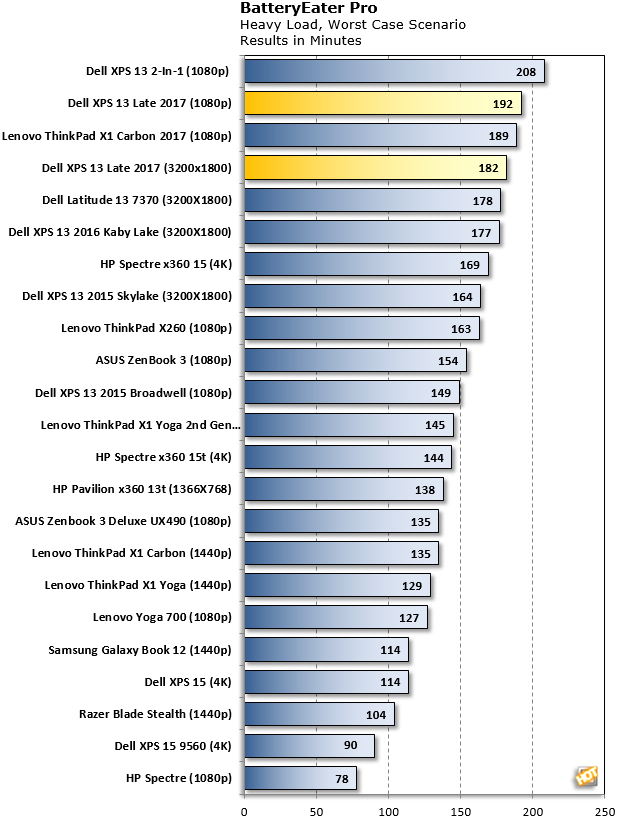Dell XPS 13 (2017) With Kaby Lake R Review: Faster, Better Than Ever
Since laptop displays significantly affect power consumption and battery life, it's important to ensure a level playing field with respect to brightness of the display for battery testing. However, since many laptop displays vary in brightness at each respective setting in Windows, this calibration with the meter is critical to ensure all displays are set to as near identical brightness as possible before testing.
Like last year's model, the refreshed XPS 13 for late 2017 offers excellent battery life, and even more so this time around. It managed to stay awake for a little over 7 hours in our custom video test, which is at the upper end of the battery life echelon. Dell also sent us a 1080p model with the same Core i7-8550U processor underneath the hood, and that one raced past Lenovo's ThinkPad X1 Carbon, powered by a first gen Kaby Lake chip, which was previously the top dog. Not anymore. The XPS 13 with Kaby Lake R and a 1080p panel lasted a whopping 10 hours and 23 minutes. That's all-day movie binge-watching if you're up for it, folks. Either that or a whole lot of productivity.
Battery Eater Pro wears systems down quickly with a heavy load on all subsystems, including processor, graphics, memory and even file transfers to storage. This is truly a worst-case test that will give you a sense of how a machine will hold up under heavy strain, while gaming or under heavy-duty continuous content creation workloads, for example.

Battery Eater Pro is a harsh battery test that assumes a worst case scenario (hence the name), so times are naturally shorter. In this case, the XPS 13 lasted just over 3 hours. While it sits three pegs from the top (likely four pegs, since we're running the 1080p model and will update this page soon), that is the longest run time of any 3200x1800 laptop we have ever tested, even if only by a few minutes. Hey, a victory is a victory, right?
Dell XPS 13 (Late 2017) Performance Analysis And Final Thoughts
The previous version of Dell's XPS 13 garnered high praise from many tech pubs and ultimately earned our Editor's Choice award here at HotHardware as well. And with the Kaby Lake R update, so does this year's model. While nearly a year has passed since the last refresh, the overall design of the machine was not in need of an overhaul per se, since the original was so popular, so Dell did not give it one. Instead, Dell simply upgraded its CPU platform to an 8th generation Intel Core i7-8550U processor option, effectively doubling the number of cores and threads for a nice performance boost. In addition, this also brought a surprisingly-strong battery life boost as well, with Kaby Lake R's better efficiency, though it still packs the same 60 Whr power plant. Regardless, the end result is the same great laptop, only faster than before, with longer battery life to boot. How can you go wrong?Dell's XPS 13 continues to encompass everything we love about ultrabooks, and then some. It is incredibly thin and light with a tapered design that is built with super-premium materials, like its hybrid carbon fiber palm rest area. Where Dell's design has a distinct advantage, however, is with its brilliant InfinityEdge IGZO display. Not only is the display panel bright and vibrant, but there is also very little wasted space with a nearly bezel-less design. By virtually eliminating the bezels, Dell is able to cram a 13.3-inch screen into an 11-inch form factor. And unlike Apple's MacBook Air (a laptop we also like, by the way), the XPS 13 comes with a touchscreen option.
That does not mean there aren't caveats or trade-offs. As with many ultrabooks, the XPS 13's memory is soldered to the motherboard, so consider carefully how much RAM you will need. The XPS 13 also technically lacks a native display output for connecting to an external monitor, though you can convert its USB Type-C Thunderbolt port to either DisplayPort or HDMI output with an optional dongle of course. However, in the grand scheme of things, these are nitpicks that are overshadowed by everything the XPS 13 does right.
We continue to be impressed by Dell's XPS 13. With an update to an Intel 8th Gen Core processor, one of the best ultrabooks on the market just got better. Pricing starts at $1,199 for a model equipped with a new generation CPU, though as configured, the model we tested primarily here (3200x1800 IGZO touch panel) runs $1,854.99. That is a premium price for sure, but it is also a performance oriented configuration with a healthy 16GB of RAM and a capacious 512GB NVMe SSD, along with a beautiful, high-res 3200x1800 touch display. Whether you need such a meaty setup or can get by with a tamer configuration, the XPS 13 is a highly recommended machine.

|
|









